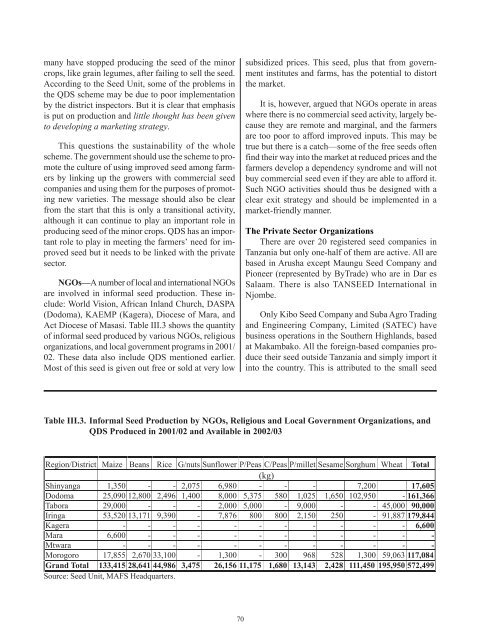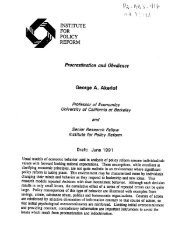An Action Plan for Developing Agricultural Input Markets in Tanzania
An Action Plan for Developing Agricultural Input Markets in Tanzania
An Action Plan for Developing Agricultural Input Markets in Tanzania
Create successful ePaper yourself
Turn your PDF publications into a flip-book with our unique Google optimized e-Paper software.
many have stopped produc<strong>in</strong>g the seed of the m<strong>in</strong>or<br />
crops, like gra<strong>in</strong> legumes, after fail<strong>in</strong>g to sell the seed.<br />
Accord<strong>in</strong>g to the Seed Unit, some of the problems <strong>in</strong><br />
the QDS scheme may be due to poor implementation<br />
by the district <strong>in</strong>spectors. But it is clear that emphasis<br />
is put on production and little thought has been given<br />
to develop<strong>in</strong>g a market<strong>in</strong>g strategy.<br />
This questions the susta<strong>in</strong>ability of the whole<br />
scheme. The government should use the scheme to promote<br />
the culture of us<strong>in</strong>g improved seed among farmers<br />
by l<strong>in</strong>k<strong>in</strong>g up the growers with commercial seed<br />
companies and us<strong>in</strong>g them <strong>for</strong> the purposes of promot<strong>in</strong>g<br />
new varieties. The message should also be clear<br />
from the start that this is only a transitional activity,<br />
although it can cont<strong>in</strong>ue to play an important role <strong>in</strong><br />
produc<strong>in</strong>g seed of the m<strong>in</strong>or crops. QDS has an important<br />
role to play <strong>in</strong> meet<strong>in</strong>g the farmers’ need <strong>for</strong> improved<br />
seed but it needs to be l<strong>in</strong>ked with the private<br />
sector.<br />
NGOs—A number of local and <strong>in</strong>ternational NGOs<br />
are <strong>in</strong>volved <strong>in</strong> <strong>in</strong><strong>for</strong>mal seed production. These <strong>in</strong>clude:<br />
World Vision, African Inland Church, DASPA<br />
(Dodoma), KAEMP (Kagera), Diocese of Mara, and<br />
Act Diocese of Masasi. Table III.3 shows the quantity<br />
of <strong>in</strong><strong>for</strong>mal seed produced by various NGOs, religious<br />
organizations, and local government programs <strong>in</strong> 2001/<br />
02. These data also <strong>in</strong>clude QDS mentioned earlier.<br />
Most of this seed is given out free or sold at very low<br />
70<br />
subsidized prices. This seed, plus that from government<br />
<strong>in</strong>stitutes and farms, has the potential to distort<br />
the market.<br />
It is, however, argued that NGOs operate <strong>in</strong> areas<br />
where there is no commercial seed activity, largely because<br />
they are remote and marg<strong>in</strong>al, and the farmers<br />
are too poor to af<strong>for</strong>d improved <strong>in</strong>puts. This may be<br />
true but there is a catch—some of the free seeds often<br />
f<strong>in</strong>d their way <strong>in</strong>to the market at reduced prices and the<br />
farmers develop a dependency syndrome and will not<br />
buy commercial seed even if they are able to af<strong>for</strong>d it.<br />
Such NGO activities should thus be designed with a<br />
clear exit strategy and should be implemented <strong>in</strong> a<br />
market-friendly manner.<br />
The Private Sector Organizations<br />
There are over 20 registered seed companies <strong>in</strong><br />
<strong>Tanzania</strong> but only one-half of them are active. All are<br />
based <strong>in</strong> Arusha except Maungu Seed Company and<br />
Pioneer (represented by ByTrade) who are <strong>in</strong> Dar es<br />
Salaam. There is also TANSEED International <strong>in</strong><br />
Njombe.<br />
Only Kibo Seed Company and Suba Agro Trad<strong>in</strong>g<br />
and Eng<strong>in</strong>eer<strong>in</strong>g Company, Limited (SATEC) have<br />
bus<strong>in</strong>ess operations <strong>in</strong> the Southern Highlands, based<br />
at Makambako. All the <strong>for</strong>eign-based companies produce<br />
their seed outside <strong>Tanzania</strong> and simply import it<br />
<strong>in</strong>to the country. This is attributed to the small seed<br />
Table III.3. In<strong>for</strong>mal Seed Production by NGOs, Religious and Local Government Organizations, and<br />
QDS Produced <strong>in</strong> 2001/02 and Available <strong>in</strong> 2002/03<br />
Source: Seed Unit, MAFS Headquarters.

















